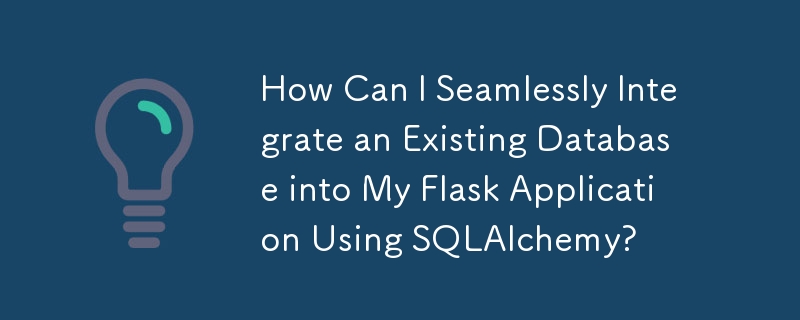Maison >base de données >tutoriel mysql >Comment puis-je intégrer de manière transparente une base de données existante dans mon application Flask à l'aide de SQLAlchemy ?
Comment puis-je intégrer de manière transparente une base de données existante dans mon application Flask à l'aide de SQLAlchemy ?
- DDDoriginal
- 2024-11-13 14:22:02295parcourir

Integrating an Existing Database with a Flask Application Using SQLAlchemy
Integrating an existing database into a Flask application using SQLAlchemy can seem daunting, especially if you're new to Flask. This article aims to provide guidance on the best approach to seamlessly connect your database to your Flask app.
Choosing the Best Approach for Integrating an Existing Database
While the question initially focuses on Flask, the core issue lies in deciphering SQLAlchemy to access the database. Therefore, it's advisable to focus on mastering SQLAlchemy first.
Getting Started with SQLAlchemy
To begin, create an engine that connects to your MySQL database:
engine = create_engine('mysql://username:password@host/database_name', convert_unicode=True, echo=False)
Next, reflect the existing tables into SQLAlchemy's known list:
Base = declarative_base() Base.metadata.reflect(engine)
Defining Models for Each Table
For each table in your database, define a model that inherits from Base:
class Users(Base):
__table__ = Base.metadata.tables['users']
Establishing Relationships
If there are relationships between tables, define them using relationship. For instance, if Users has a related table Orders:
class Orders(Base):
__table__ = Base.metadata.tables['orders']
user_id = Column(Integer, ForeignKey('users.id'))
user = relationship("Users", backref=backref("orders", uselist=False))
Executing Queries
To query the database, create a session and use the ORM's query interface:
from sqlalchemy.orm import sessionmaker, scoped_session
Session = sessionmaker(bind=engine)
session = scoped_session(Session)
for user in session.query(Users):
print(user)
Integrating SQLAlchemy into Flask
Once you're comfortable with SQLAlchemy, integrating it into Flask is straightforward. You can use Flask-SQLAlchemy, an extension that provides an ORM for the ORM. This extension will automatically create the session object and handle database connections and transactions.
Conclusion
By following these steps, you can successfully integrate an existing database into a Flask application using SQLAlchemy. Remember to thoroughly explore the documentation and practice implementing queries and relationships to gain familiarity with SQLAlchemy.
Ce qui précède est le contenu détaillé de. pour plus d'informations, suivez d'autres articles connexes sur le site Web de PHP en chinois!

